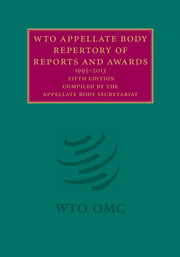Book contents
- Frontmatter
- Contents (outline)
- Contents
- Foreword to the 1995–2013 edition
- List of Abbreviations for Parts I and II
- Part I Appellate Body Reports
- A
- B
- C
- D
- E
- F
- G
- H
- I
- J
- L
- M
- N
- O
- P
- Q
- R
- S
- T
- V
- W
- PART II Arbitration Awards under Article 21.3(c) of the DSU
- Annexes
- Abbreviations used in the Table of References to the Covered Agreements and Other Instruments and in the Indexes
- Table of References to the Covered Agreements and Other Instruments by Article
- Subject Index
- Subject Index by Case (Appellate Body Reports)
- Subject Index by Case (Arbitration Awards under Article 21.3(c) of the DSU)
P
from Part I - Appellate Body Reports
Published online by Cambridge University Press: 05 March 2015
- Frontmatter
- Contents (outline)
- Contents
- Foreword to the 1995–2013 edition
- List of Abbreviations for Parts I and II
- Part I Appellate Body Reports
- A
- B
- C
- D
- E
- F
- G
- H
- I
- J
- L
- M
- N
- O
- P
- Q
- R
- S
- T
- V
- W
- PART II Arbitration Awards under Article 21.3(c) of the DSU
- Annexes
- Abbreviations used in the Table of References to the Covered Agreements and Other Instruments and in the Indexes
- Table of References to the Covered Agreements and Other Instruments by Article
- Subject Index
- Subject Index by Case (Appellate Body Reports)
- Subject Index by Case (Arbitration Awards under Article 21.3(c) of the DSU)
Summary
Panel Reports
P.1.1 Basic rationale behind findings and conclusions. See also Claims and Arguments (C.1); Claims and Panel Reasoning (C.2); Standard of Review (S.7)
P.1.1.1 Korea – Alcoholic Beverages, paras. 166, 168
(WT/DS75/AB/R, WT/DS84/AB/R)
Korea claims that the Panel has failed to fulfil its obligation under Article 12.7 of the DSU to set out the basic rationale behind its findings and recommendations. …
…
In this case, we do not consider it either necessary, or desirable, to attempt to define the scope of the obligation provided for in Article 12.7 of the DSU. It suffices to state that the Panel has set out a detailed and thorough rationale for its findings and recommendations in this case. The Panel went to some length to take account of competing considerations and to explain why, nonetheless, it made the findings and recommendations it did. …
P.1.1.2 Chile – Alcoholic Beverages, para. 78
(WT/DS87/AB/R, WT/DS110/AB/R)
… In our view, in this case, the Panel did “set out” a “basic rationale” for its finding and recommendation on the issue of “not similarly taxed”, as required by Article 12.7 of the DSU. The Panel identified the legal standard it applied, examined the relevant facts, and provided reasons for its conclusion that dissimilar taxation existed. …
P.1.1.3 Argentina – Footwear (EC), para. 149
(WT/DS121/AB/R)
… In this case, the Panel conducted extensive factual and legal analyses of the competing claims made by the parties, set out numerous factual findings based on detailed consideration of the evidence before the Argentine authorities as well as other evidence presented to the Panel, and provided extensive explanations of how and why it reached its factual and legal conclusions. Although Argentina may not agree with the rationale provided by the Panel, and we do not ourselves agree with all of its reasoning, we have no doubt that the Panel set out, in its Report, a “basic rationale” consistent with the requirements of Article 12.7 of the DSU.
- Type
- Chapter
- Information
- WTO Appellate Body Repertory of Reports and Awards1995–2013, pp. 744 - 786Publisher: Cambridge University PressPrint publication year: 2014



